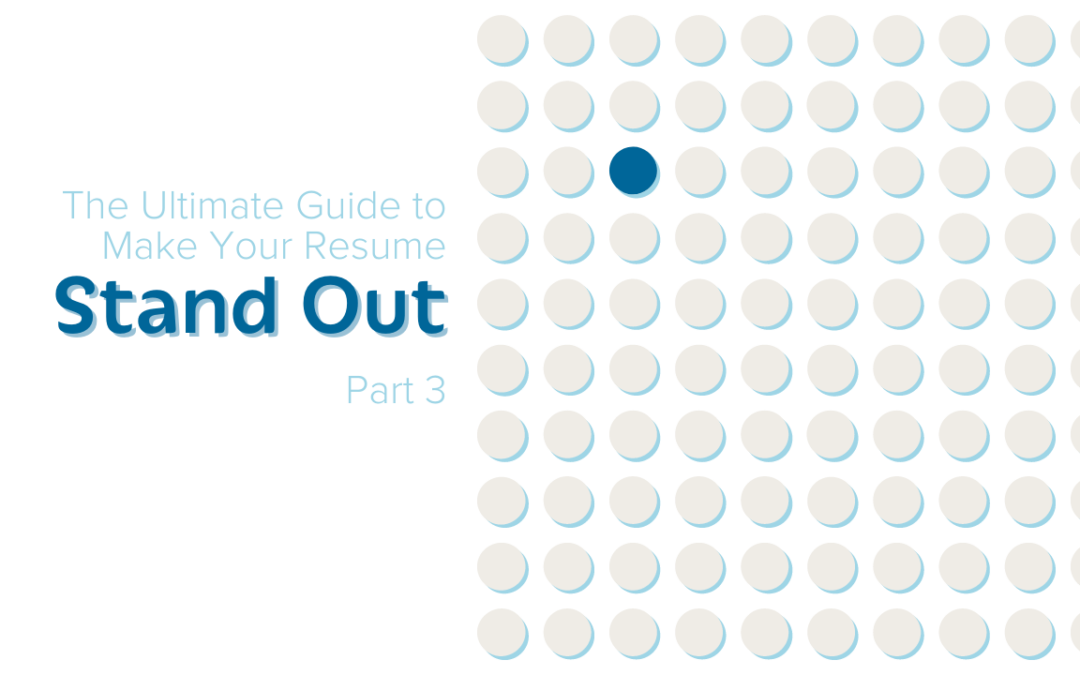*This post is part 3 of 3 of an article that originally appeared on HeYo on February 3, 2023. Check out this post and more content at www.heyo.at.
Part III: Tips to Make Your Resume Stand Out
Wondering, How to make my resume stand out when applying for a specific job? Yes, it’s important to tailor each version of your resume for each specific job you’re applying for. You can do this by targeting keywords, including listing and company culture keywords.
1. Target Keywords
Want to know what hiring managers are looking for in a candidate? They already told you in the job description. Look for potential keywords the employer had in mind. Is there a way for you to incorporate those keywords into your resume? In sought-after positions, it’s not uncommon for hiring managers to sift through hundreds or even thousands of resumes. Make sure you’re making it easy for them to find you.
2. Make Your Resume Visually Appealing
A visually appealing resume means one that is clean, concise, and consistent. Visually appealing does not mean standing out in the wrong way though. Consider the following guidelines:
- Fonts/colors: Choose these accordingly. When in doubt, keep it simple, especially if you’re applying for a corporate job.
- Follow the company’s lead: If you’re applying for a position in design, you may be able to get away with more creativity (in fact, playful creativity may help you get noticed!).
- Make the right first impressions: Standing out isn’t always a good thing, make sure you are making the right first impressions, don’t use garish designs that make people remember you for the wrong reasons.
- Format: Check the job listing for formatting instructions. When in doubt, format your resume as a PDF.
- Title: Don’t save the file as “resume” or it might get lost in the hundreds of other resumes with the same label. Instead, make the title of the document your name.
- Follow instructions: Job listing instructions always supersede other advice.
3. Pay Attention to Details: Proofreading Checklist
One of the most common resume questions (other than, “How to make my resume stand out”) is, “How can I make my resume look polished and professional?”
- Did I use one space after periods or two?
- Have I used half-sentence or half-phrases?
- Did I include punctuation with sentence case?
- Is my date formatting consistent?
- Have I paid attention to font, color, alignment, spacing, and verb tenses?
We also recommend:
- Omitting your address (city and state are fine)
- Asking a friend or colleague to proofread
- Limiting resume to one page (unless your accomplishments are significant)
Tips From Recruiters and Hiring Managers
Our no. 1 tip from HR and recruiters when trying to find out how to make my resume stand out? Write your resume for both humans and applicant tracking systems (ATS). Before a resume is ever seen by your future boss, it needs to clear a few hurdles: human and computer systems. Yes, write your resume for ATS. If you don’t, it may never see the light of a laptop screen. But also write it to catch the eye of the recruiting team.
A person!
Where is someone’s eye drawn when they first see your resume, are you clearly explaining not only what you did in a role but the impact you had, and lastly does your resume highlight the qualifications needed for the role.”
The Great Resignation/Future of Work Culture: Addressing Resume Gaps
The future of work is still somewhat… unsolidified. The Great Resignation is still changing workplace culture in real-time.
Now more than ever, it’s common for workers to take career breaks for reflection, refocus, or personal reasons. The only thing that is certain in future workplace trends?
Life happens.
So how do you address these gaps? Talk about how you used your time. Did you learn any new skills? Are you re-energized by a new industry or role? Are you more motivated than ever to rejoin a team?
Hiring managers would rather work with someone who’s hungry and eager than someone who is just moving from one role to another. Andrea Logan, Career Coach recommends blurring the gap and highlighting the work you have been doing unpaid.
“Just because you may have not been getting a physical “check” doesn’t mean that you haven’t been working hard, gaining skills, networking, or utilizing complex problem solving daily.”

